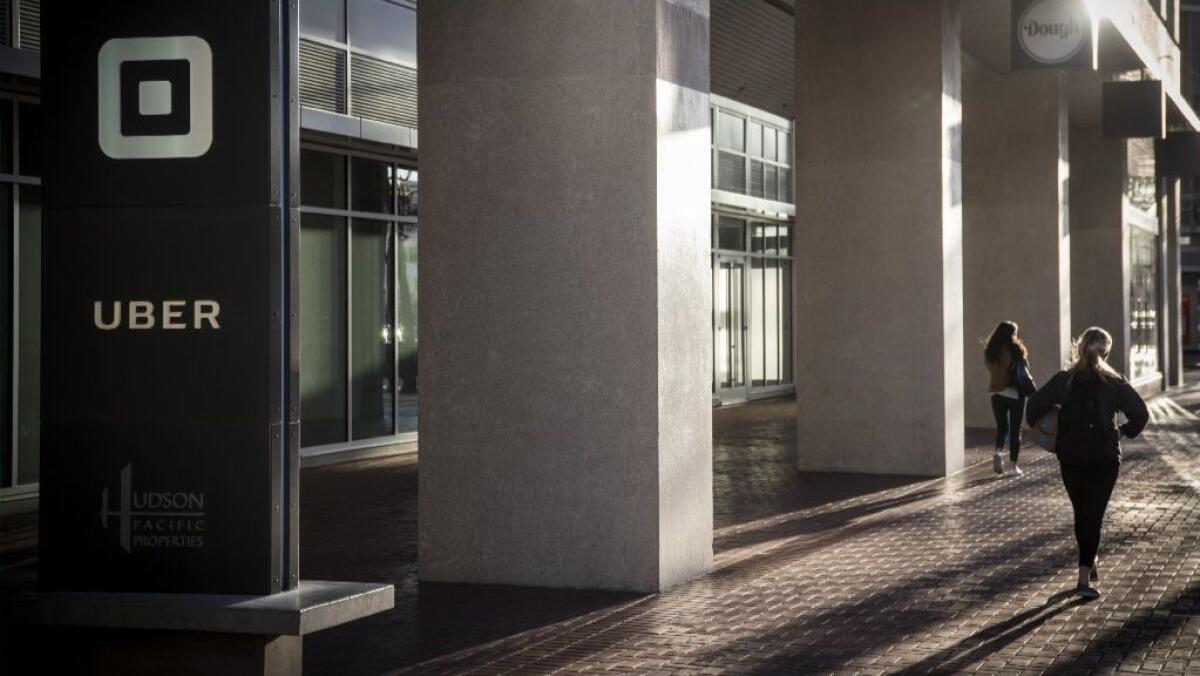Op-Ed: The courts decided gig workers are covered by wage and overtime protections. Now their bosses are trying to evade the law

- Share via
Gig companies such as Uber, DoorDash and Instacart portray themselves as brave and brilliant innovators, underdog entrepreneurs whose explosive growth simply reflects that they’ve built a better mousetrap. But the companies have been sued again and again, in the United States and around the globe, by workers who say these businesses prosper by violating their workers’ basic legal rights.
That charge invites a question: Can gig companies survive without breaking the law? Apparently not, according to the companies.
In April, the California Supreme Court updated the test to determine who should be classified as an employee eligible for state minimum wage and overtime protections. Under the prior test, courts examined 11 factors to determine eligibility. That complexity made wage-theft cases that turned on employee status notoriously difficult and costly to prosecute, especially for low-income workers. The court, in Dynamex Operations West, Inc. vs. Superior Court of Los Angeles County, sensibly simplified the test by, among other things, placing the burden of proof on businesses.
Dynamex is a landmark decision. It promises vulnerable workers a fair shake in court, a means to fight for stolen wages. Using the updated test, Uber drivers — as an example — would be considered employees, not independent contractors, for wage protections. Uber would have to make sure the percentage of fares that drivers earned, divided by the hours they worked, was more than the state minimum wage of $11 an hour, or be liable for the difference. If drivers worked more than a 40-hour week, Uber would have to pay overtime.
Can gig companies survive without breaking the law? Apparently not, according to the companies.
The gig companies, along with the California Chamber of Commerce, are trying to make sure the Dynamex rules will never be enforced. Uber, Lyft, DoorDash, Instacart, TaskRabbit and Postmates, among others, sent a letter to Gov. Jerry Brown’s office pleading for executive action to undermine the decision. The chamber is also pushing specific legislation to undo the Dynamex decision.
These companies want us to believe that worker protections are old-fashioned, and that minimum wage and overtime rules stifle entrepreneurial activity. Venture-capital-backed gig businesses complain of being “hamstrung” by the Dynamex ruling, forced to jettison the flexibility of gig work that many workers need and want. But the court’s powerful language tells a different story: The Dynamex decision benefits “law-abiding businesses” who “are hurt by unfair competition from competitor businesses that utilize substandard employment practices.” It ensures that workers get what they are owed for their labor: “a modicum of dignity and self-respect.”
Enter the Fray: First takes on the news of the minute from L.A. Times Opinion »
Uber and its ilk claim that the Dynamex decision “threaten[s] the livelihoods of millions of working Californians,” but minimum wage and overtime protections in fact ensure that people can earn at least subsistence wages. Such a wage floor does not undermine gig work, it supports it. Poverty, after all, provides the opposite of flexibility. As one on-demand driver, who works 18 hours a day, six days a week to eke out a living, told me, “I sleep in my car; I eat in my car; I work in my car. That is not freedom.”
In seeking a political bailout from a well-reasoned and unanimous California Supreme Court decision, these companies are deploying significant capital. With the help of more lobbyists than Microsoft, Amazon, and Walmart combined, they have rewritten laws to their advantage in 41 states and shirked responsibility to workers in all 50, according to a report by the National Employment Law Project. Their actions and policies have not only deepened economic inequality, they have encouraged anti-competitive business practices, undermined the democratic process and cost local governments billions of dollars in lost revenue. We cannot let this go on in California.
The governor and the Legislature may soon choose a side in this fight. As they get bombarded by chamber and gig-business lobbyists, they should remind themselves of what’s at stake and who the contenders are. This isn’t a battle to turn back the clock on technology and innovation, nor is it about denying worker freedom or employer control. It is about economic justice. On one side of the fight are working California families, and on the other, billion-dollar companies backed by venture capitalists. What hangs in the balance is whether those whose labor produces value for our economy will be paid enough to survive and thrive.
Eighty years ago, when he fought for the first federal minimum wage, President Franklin D. Roosevelt famously argued, “No business which depends for its existence on paying less than living wages to its workers has any right to continue in this country.” Time and technology have not changed this basic principle. If these innovative, well-funded companies can’t find a way to play by the rules, they have no business operating in California.
Veena Dubal is an associate professor of law at UC Hastings College of Law whose research on worker status was cited by the California Supreme Court in the Dynamex decision.
Follow the Opinion section on Twitter @latimesopinion and Facebook
More to Read
A cure for the common opinion
Get thought-provoking perspectives with our weekly newsletter.
You may occasionally receive promotional content from the Los Angeles Times.









